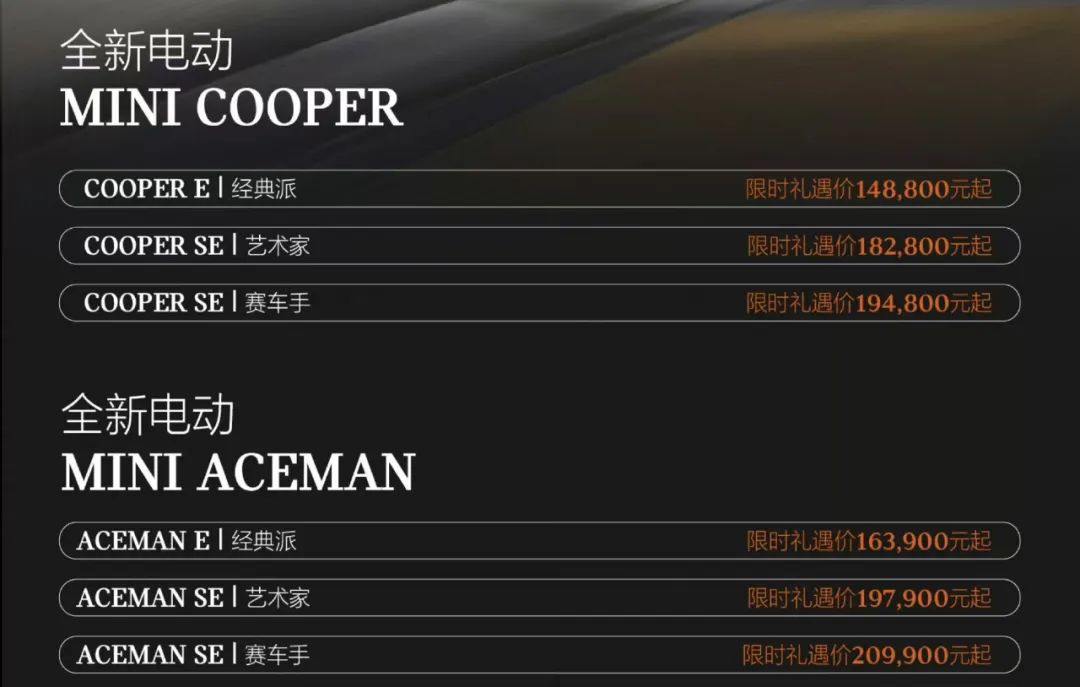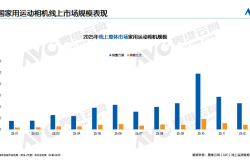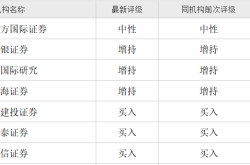MINI, the legend is no more
![]() 10/29 2024
10/29 2024
![]() 442
442
"Young people no longer buy into brand loyalty"
Body
MINI, which focuses on trendy and individualistic branding, cannot escape the price war.
Recently, MINI officially announced a comprehensive price reduction for its electric vehicle models.

Among them, the price of the new electric MINI COOPER has been adjusted to start at 148,800 yuan, a decrease of 41,000 yuan from the launch price of 189,800 yuan in July this year; the price of the new electric MINI ACEMAN has been adjusted to start at 163,900 yuan, a decrease of 46,000 yuan from the launch price of 209,900 yuan in August this year.
For all customers who have previously purchased these two models, MINI China will guarantee their prices in cash.
Moreover, in addition to the starting price adjustment, MINI has also eliminated the entry-level versions of the two models. If calculated based on models with the same configuration, the actual price reduction for these electric MINI models is as high as 57,000 to 70,000 yuan.
Just 3.5 months after its launch, the electric MINI suddenly saw a significant price drop. As a representative of BMW Group's personalized luxury brand, its brand premium is disappearing.
The harsh reality
Numerous elements such as colorful color schemes, round headlights, go-kart-like driving experience, and round borderless OLED center consoles make the electric MINI stand out among various models. The MINI series is known for its trendy, fashionable, and enjoyable qualities.
Unfortunately, as BMW Group's first model truly built on an electric platform, the electric MINI faces a Chinese market flooded with numerous new brand automakers. Not only have domestic electric vehicles already played out the labels of youth, but young people's brand loyalty is also relatively weak, making them vulnerable to price.
In this intense competition within the electric vehicle market, consumers demand tangible sincerity from brands in terms of configuration.
From a product perspective, both the electric MINI COOPER and electric MINI ACEMAN inherit the classic design elements of the MINI brand while making adaptive adjustments for electrification. The driving range of both models is around 450 kilometers, which is not outstanding; their acceleration performance of 7-8 seconds is also average among electric vehicles.
Specifically, MINI is not outstanding when compared to competing models.
Taking the electric MINI COOPER E Classic as an example, priced at 148,800 yuan, its three-door, four-seat body size is too small, with a length of less than 3.9 meters and a wheelbase of less than 2.6 meters. A smaller car means less practicality; in contrast, the BYD Dolphin and Geely Xingyuan both exceed 4.1 meters in length, with the Dolphin having a wheelbase of 2.7 meters and the Xingyuan having a wheelbase of 2.65 meters.
Secondly, as a new energy vehicle, it lacks both L2-level assisted driving and adaptive cruise control, featuring only cruise control. Mercedes-Benz's smart #1, also a BBA brand, offers L2-level assisted driving at an official guidance price of 154,900 yuan.
Moreover, the electric MINI COOPER E Classic only comes with a reversing camera; the Mercedes-Benz smart #1, priced at less than 160,000 yuan, is equipped with a 360-degree panoramic camera.
One of the most criticized points is that none of the electric MINI models are equipped with a heat pump air conditioning system. Heat pump air conditioning is particularly important for electric vehicles in cold winter regions, as electric vehicles using heat pump air conditioning can reduce energy consumption by about 60% and increase driving range by about 25% in winter by reducing the use of heating equipment.
Taking the Mercedes-Benz smart #1 as an example again, all but the lowest and second-lowest configurations are equipped with heat pump air conditioning.
Relatively speaking, the new electric MINI is neither practical nor luxurious, nor is it inexpensive. Its competition for market share can only rely on fun, fashion, and sentiment.
Chinese consumers have voted with their feet. Although MINI has not disclosed sales figures, according to new vehicle insurance data, sales of the electric MINI COOPER in July, August, and September were 578, 331, and 197 units, respectively, with a cumulative sales volume of 1,106 units since its launch on July 6. The electric MINI ACEMAN was launched on August 27 and sold only 179 units in September.
The dismal sales forced MINI to reduce prices, but price adjustments are only part of the market competition.
In the electric vehicle market, consumers are increasingly concerned about the level of vehicle intelligence, charging convenience, and after-sales service. For BMW MINI to stand out in this competition, it needs to bring more unique selling points.
Quality remains to be verified
This electric MINI is actually produced by Beam Automotive Co., Ltd., a joint venture established by Great Wall Motor and BMW Group in July 2018. However, the progress of this cooperation project has been much slower than expected. Five years later, the domestically produced all-new electric MINI model was officially mass-produced and rolled off the production line at Beam Automotive's factory in 2023, a case of "getting up early but arriving late."
However, shortly after the launch of the new model, a large-scale recall once again pushed the MINI brand to the forefront of public attention.
On September 11, the State Administration for Market Regulation issued a recall notice for BMW automobiles.
Among them, Beam Automotive recalled 5,552 domestically produced MINI COOPER vehicles manufactured between June 1, 2024, and August 30, 2024, as well as 2,682 domestically produced MINI ACEMAN vehicles manufactured between June 24, 2024, and August 30, 2024.
The reason for the recall is that due to manufacturing issues, the electrical signal of the motor position sensor in the integrated brake boost device (DSCi) of some vehicles within the recall scope may be disturbed, which may cause the DSCi to fail to provide assisted braking, affecting the functions of the anti-lock braking system (ABS) and dynamic stability control system (DSC), posing a safety hazard.
The recall of the new model shortly after its launch due to quality issues undoubtedly dealt a heavy blow to the brand's reputation and customer trust.
Misfortunes never come singly. Previously, on August 28, BMW announced a global recall of over 12,500 Mini Cooper SE electric vehicles. The recall decision stems from a Mini Cooper SE fire incident that occurred in the United States in October last year. In January this year, a similar incident occurred in Germany.
BMW stated that faults in the high-voltage battery or high-voltage system could cause a short circuit, leading to overheating or even a fire, even when the vehicle is not in operation. The specific cause is still unclear, and the official document only states that it "may be caused by a variety of factors."
Frequent quality issues expose Beam Automotive's inadequacies in quality control and cast doubt on BMW's competitiveness and quality control capabilities in the electric vehicle field. Moreover, the additional costs incurred by recalls, including repairs, part replacements, and customer compensation, will affect BMW's financial performance.
Competition is always brutal. While BMW MINI is recalling problematic vehicles and proactively choosing to lower prices, its competitors are not stopping. At the Paris Motor Show on October 14, the Zero Run B10 made its debut with an expected price starting at 100,000 yuan; on October 18, BYD Dolphin 06GT was announced at a price of 136,800 yuan, further intensifying the price war.
MINI has little time left to extol sentiment and promote brand value. This 65-year-old brand may struggle to continue its legend.







